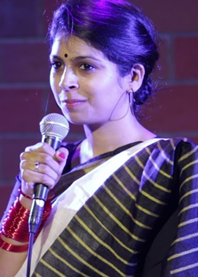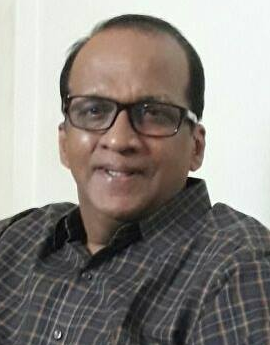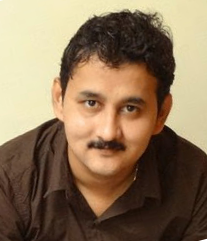 Mehak Mirza Prabhu is a Mumbai based storyteller, full-time writer, voice-over artist, performer, mentor, blogger, scriptwriter and social enthusiast. She creates fictional stories in multiple languages. She also runs an online story telling school, ‘Jhumritaliaya’. She has a huge fan following both online and offline. Her TEDx talk, “How Story Telling Saved Me,” is a true account of her life experiences. It has been highly appreciated online. Many of her stories are widely accessed on YouTube.
Mehak Mirza Prabhu is a Mumbai based storyteller, full-time writer, voice-over artist, performer, mentor, blogger, scriptwriter and social enthusiast. She creates fictional stories in multiple languages. She also runs an online story telling school, ‘Jhumritaliaya’. She has a huge fan following both online and offline. Her TEDx talk, “How Story Telling Saved Me,” is a true account of her life experiences. It has been highly appreciated online. Many of her stories are widely accessed on YouTube.
Open Interview features Mehak Mirza Prabhu’s interview with Satish Bendre and Santosh C Hulagabali. In this interview, you will notice how natural, honest and gifted storyteller she is. Her answers are not studded with academic theories of art of storytelling but are full of wisdom and commonsense replete with deep understanding of what she does and how she does. You will also feel how different, simple and clear she is in her thoughts and actions.
(This interview is also available in Marathi)
SB: How did your storytelling journey start?
There comes a moment in life where God gives you a taste of what you are meant to do in life. You either ignore that or you pursue it. I pursued it. Being a business woman for a decade before that, naturally made me keep a plan in mind at every stage of this adventure.
SB: In the fast-paced digital era, do you think storytelling is no more that attractive to children as the parents do not have time to sit with their children and tell stories, especially bed time stories?
I would not generalise it that parents don’t have time. It differs from family to family. I believe today’s parents, in fact, are more conscious about what experiences they provide
to their kids. So, there are a lot of distractions and activities in today’s kids’ life. I am more concerned about the adults having lost stories in the form of storytelling, in their life. Bringing back the imagination and stories can bring back the child in you and reduce stress in life.
SB: Over the years, the span of attention of the younger generation has reduced to just a few seconds, do you think, the revival of storytelling could increase the attention span?
We need to just talk their language and they will happily give their attention. The onus of drifting attention of the audience lies on the performer. I feel the younger generation is not as bad as they are made to seem like. In fact, they are still moulding and are very open.
SCH: How important is storytelling in the classroom teaching- whether it is in school or college or university? How teachers (of any subject/discipline) should catch up with the art of storytelling and thus make the learning more interesting?
I feel teachers should definitely explore storytelling, not for the kids but for exploring the depths of their own feelings. A storyteller becomes more aware of his/her surroundings and feels more compassionately for others. This will just make them better teachers!
SCH: How important is reading (for one) to become a good storyteller?
Personally, I think, you do not need to be well read to become a storyteller. Being more observant of the real world around you, having opinions, and being a kid at heart is more important.
SCH: What according to you are the qualities required to develop the ability of putting across one’s ideas/ experiences through stories?
The willingness to share what is inside you, with the world, without expecting anything back, is all that a storyteller needs to possess. And that is the most demanding quality.
SCH: You have great acting skills. We can see that element in many of your storytelling sessions. I feel that a good storyteller should have acting skills to make an impact (apart from body movement, cueing, voice modulation, etc.) What do you say?
Each one of us is a born storyteller. If one can talk or express through sign language, one is a storyteller. Now the style of storytelling will be unique to each person, as each individual is unique. Some might have a style of narration or command on word flow that won’t require any acting. Enacting characters is just something I enjoy doing, it’s not a necessity. The biggest example is Gulzar Sahab. He just narrates and the story comes alive!
SCH: When it comes to sources of stories, which option is easier: telling stories from our own life experiences or others’ experiences or reading (of any literary stories)?
None is easy, that’s the beauty of it. From wherever the source comes, even if it is from outside, you still have to feel and live it as your own, to do justice to it while presenting. You will be shedding a part of you each time either ways.
SCH: In your personal experience and observation, what kinds of stories make more impact on the people’s mind- traditional story forms (such as fairytales, folktales, mythologies, legends, fables, etc.) or the contemporary stories (based on history, polity, personal narrative, etc.)?
This is like asking which cuisine is most favoured. There is no answer to that. We all have varied tastes, there is an audience for all kinds of stories. As a storyteller you work with stories that you love. Stay honest to your instincts while creating stories and do not think about what will work better.
SCH: Many of your stories are predominantly contemporary or of the present time. Is it purposeful selection or you have not explored other forms of stories much?
I have never thought of any story as to which style or genre they fit in. A story is a story. I just stay honest to what I feel and to the thoughts that come to me. I am just a medium, I follow instructions that my mind, heart and soul give. I am no one to select my stories, the story selects me.
SCH: What sorts of preparation and efforts go into telling stories on stage? Please share your own experiences right from planning to executing the stories.
As soon as the idea pops in, I sit with the pen and paper, never to delay, even if it’s middle of the night. Then just let it flow. Next work on the script is to tighten it and make it best for narrative format. And then it’s- rehearse, rehearse, rehearse. No amounts of rehearsals are ever enough.
That’s the general way it goes.
SCH: You love writing. How easy or difficult is it to write stories than tell them on a stage?
It’s not really different because while I write, I am already on stage- in my mind. They go hand in hand.
SCH: How do one’s own life experiences influence a storyteller?
Like I said, your stories are a reflection of you, that as if you stay honest and don’t write thinking what will work with the audience. And your life experience is what has moulded you into the person you are today. So, it completely influences your stories.
SB: The pattern of communication has changed with digital boom. We are now becoming less expressive, crisper, short and leading to a feeling of isolation. What do you have to say in this regard?
It’s a personal choice. I still write letters, I tell long stories on this same digital platform. We tend to blame technology for our lack of self-control. We forget that we still can make changes and choices. We are not puppets.
SCH: Some people have an exceptional talent in telling stories but they have not explored their talent by sharing them on a stage or find it difficult to tell stories on a stage. What is your advice to such potential storytellers?
Step on that stage. Trust me, it doesn’t bite, in fact, it will give wings. I had extreme stage fright. I still get very nervous each time I have to step on a stage. But trust me, it’s worth defeating a fear. Also believe me, no one will judge you once you stop judging yourself.
SB: How one should use technology or internet for sharpening the storytelling skills?
By sharing your stories firstly with friends and family and take constructive feedback. Then share it with the world. Internet has made it so easy and possible.
SCH: Any specific online tool or apps or e-resources you use for storytelling or while preparing for it?
Yes. The airplane mode! Yes, go offline while creating stories. That will keep them real. It’s like they say, ‘keep your phone aside to raise your child well’. Give him/her full attention. About resources, you should look out for offline courses and mentors to sharpen the craft further. But nothing should stop you from starting.
SB: Who is your favorite storyteller?
Gulzar Sahab
SB: What categories of audience do attend your storytelling sessions?
There is no category of audience. There is a child in an adult, a maturity in a child, a man in a woman and vice versa. I don’t know who comes but I know a Human Being full of feelings leaves each time.
SB: Please tell us about your online storytelling pathshala, Jhumritalaiya.
It’s my biggest dream to eventually have a small town of storytellers called Jhumritalaiya where one can learn, narrate and have fun. Right now the baby steps have started through online and offline classes.
SCH: We know you are one of the finest story tellers. But if you assess yourself as a storyteller, what strong and weak points you often find in you and how do you address them?
I don’t judge myself. I welcome all my attributes equally. They all make me up one whole. And I am just a storyteller.
SCH: What are your future plans?
SB: Any plans to work in Bollywood?
Future plan is to make storytelling so entertaining and cool that someday an actor from Bollywood should be asked as a question, “You are the finest actor, any plans of trying storytelling?”
¤¤¤¤
Note · All answers/ views expressed in this document are of the interviewee. ![]()
[Disclaimer, Volunteer, Translate]
Cite: Bendre, Satish & Hulagabali, Santosh C. (2019 February, 21). I am no one to select my story, the story selects me. [Blog post]. Retrieved from https://openinterview.org/2019/02/20/i-am-no-one-to-select-my-story-the-story-selects-me-mehak-mirza-prabhu/
Credits: Mehak Mirza Prabhu’s photograph- https://www.yourquote.in/
Interviewee: To know about Mehak Mirza Prabhu’s life and activities, visit thetalentedindian.com or visit her official accounts on social networking sites: Facebook, Instagram, YouTube, Linkedin

Satish Bendre is a life coach, trainer, writer, lecturer and voracious reader. His long and varied corporate stints of over three decades allowed him to develop expertise in team building, negotiation, inter-personal relationship, leadership, stress management, soft-skills, etc. He retired as Manager, Supply Chain from Johnson & Johnson and now he is a successful life coach . His training sessions are well received and appreciated by corporate firms, academic institutes, service industries, etc. Email: satishbendre91@gmail.com

Santosh C Hulagabali,PhD. is Moderator of Open Interview. He heads Library and Information Centre of Khandwala College, Mumbai. He is passionate about anything that is creative, challenging and positively impacts self and others. Email:santosh@nkc.ac.in


Just read it sir, Great initiative. U proved that the best Librarian can do best work with best perfection.
Well designed questionaries and Mehek Mirza Prabhu responded naturally, embracing each perspective with an emotional touch.
The time and efforts you have put into this work that is beyond excellence.Congratulations… Keep up the good work👍
Thanks very much Khadijaji
Just read it, amazing work Sir!! It was great pleasure to read this interview. Definitely going to share this with my friends.
Thanks Vruti
She is an amazing storyteller. Sir, you are doing great work. Learning different skills through your Open Interview.
Thanks so much Deepali.
Congratulations! Your both the interviews are excellent. Interviewing is an art. It is not simply a matter of asking questions and taking down the responses. You have an innate ability of interviewing. Your interviews reflect the degree of preparation you have put into it – acquiring thorough knowledge about the background of the subject and the interviewee. You are an active listener as well as good writer. Keep it up.
Thanks for the appreciation and your continued support
Just read it. Comprehensive and insightful interview. I tell stories in class and to my children. I can relate to what she said. Thanks for this wonderful write-up.
Good to know. Thank you.
Great pleasure reading this interview. She is an amazing storyteller. Thanks for sharing such a wonderful interview.
Thanks so much.
Excellent interview
Thank you Madam.
Remarkable work Sir. Well organised questions. Congrats. Keep it up.
Thank you.
Superb interview with Mehak Mirza. You totally rocked it. Her last answer is superb. It is like.. it will make anyone fall in passionately for this lovely art of storytelling.
Thanks a lot.
Great sir. I really endorse Ms Mehak Mirza Prabhu’s storytelling in teaching in the class room. Students listen with rapt attention when you teach them through real stories and experiences.
Satish Bendre sir is well known team leader and life coach. Excellent interview. Covered all aspects. Keep it up.
Thanks a lot Radhaji.
Enjoyed your open interview with Ms. Mehak Mirza on storytelling.
Thanks very much Sir.
Read and enjoyed the Interview. Beautifully constructed and woven. The questions are very relevant and apt for the present generation. By reading this interview, one can understand what goes into the mind of story teller. Thank you and keep posting.
Thanks Rameshji for the appreciation.
A well-designed, descriptive and informative interview.
Truly, Mehek Mirza Prabhu aims to revive to dying art of original story telling.
She is blessed with immense creativity and strength and is inspiration for all especially the younger generation.
Thanks a lot for sharing this interview.
Thanks very much Veera.